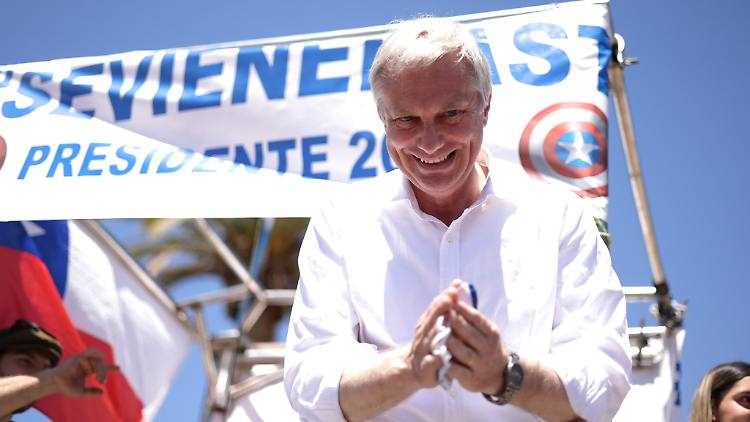Sunday 21 November 2021
Upheaval and presidential election
In Chile, the counter-revolution beckons from the right
By Viktor Coco, Santiago de Chile, and Roland Peters, Buenos Aires
It is a historic step forward: after the street revolution, a new, progressive constitution is in the works in Chile. But with José Antonio Kast, the country could opt for an ultra-conservative president.
In Chile, the future is in the air. A directly elected parliament is working out a new constitution for the South American country. In the south, the indigenous Mapuche want to achieve more independence. And today, Sunday, the first round of the presidential election will take place in a way that Chile has not seen for decades: the former left student leader Gabriel Boric wants to make the country more social, his greatest adversary is the neoliberal and ultra-conservative José Antonio Kast, who has completely different plans . “Trust yourself” is his election slogan.
Boric had started the student movement ten years ago and with it the revolution among the 19 million inhabitants, which culminated in the constituent assembly that is currently at work. If she has her way, the future president should then cast the text into laws in her progressive spirit. Boric has already announced that he wants to be converted into a welfare state based on the European model. But it is not certain that it will come to that. The 35-year-old leads the polls together with Kast, in all likelihood there will be a runoff between the two. The 55-year-old goes for the slogans of family, freedom and security to catch votes, he rejects a welfare state. He is to the right of the current Conservative President Sebastián Piñera, who is not allowed to run.
Such positions are completely contrary to the social developments of the last two years. In Chile in 2019, months of street battles with the militarized state power manifested a movement that channeled anger built up over decades, nourished by exploitative working conditions, the underfunded education and health system and gloomy pension prospects. It discharged itself against the uniformed men and an elite of politicians and entrepreneurs who had established themselves in the dictatorship of Augusto Pinochet and who still felt that everything was in control. The politicians and President Sebastián Piñera relented and had a referendum held on the replacement of the constitution from Pinochet’s time. An overwhelming majority decided that this should be done by a representative body without politicians in office.
But every movement has a resistance. Kast is the right-wing counterrevolution candidate. Some of them gathered a few days before the presidential election in Araucano Park in the capital Santiago de Chile. You have come to the upscale neighborhood of Las Condes to support José Antonio Kast. A big stage has been set up, more than a thousand people are there, flags are blowing in the wind. Some of them wear Make America Great Again caps. Why Trump? “Because he was also guided by God in his politics,” says 50-year-old Luís Alberto Gutiérrez, with a straw hat and checked shirt, who is campaigning for higher penalties for child abuse with a meter-high flag. He values Kast because he wants to promote traditional families and oppose “indoctrination of children” in sexual education in schools, as he says.
Kast has nine children himself and stands for restrictive positions on abortion and contraception. He is considered so conservative that he recently became a YouTuber tested: He should roll a condom over a banana. Kast took part, after all, it’s also about the votes of young voters, but only half rolled off the condom and warned: “You don’t do that in public!”
Soft words, tough election platform

Kast’s family got rich with the production of sausage products and a restaurant chain called “Bayern”.
(Photo: REUTERS)
The lawyer is the youngest child of German immigrants who emigrated from Bavaria to Chile after the Second World War. His brother was a minister under Pinochet, other family members are said to have denounced opposition members at the time. The 55-year-old himself is also accused of lacking distance from the dictatorship – in the best case scenario. It is his second candidacy after 2017, when he lost to entrepreneur Piñera. “Pinochet would vote for me,” he said at the time. Almost 8 percent of the voters gave him their vote.
Such a sentence brings back memories of the darkest times. During the military dictatorship from 1973 to 1990, tens of thousands of opponents of the regime disappeared, were tortured or murdered in Chile. More than 200,000 Chileans fled into exile. Accordingly, Kast, who is repeatedly compared by political analysts with Bolsonaro or Trump, but presents himself as a level-headed explanation, not as a screamer. However, his plans are similar: he wants to prevent illegal immigration, for example, with a ditch and fences.
The ultra-conservative circles in Chile do not mind such comparisons, they are behind Kast anyway. They had also criticized the incumbent Piñera in his actions against the demonstrators in 2019 as too lax. The United Nations and other international organizations condemned the targeted police violence at the time.
The closer the election has come, the more Kast has put tough positions in his election program into perspective, striving for a softer discourse in order to win votes from the middle. The last time he was confronted with his negative attitude towards same-sex marriage on television, he replied with a smile that everyone is free. And in the last television debate of the candidates, he claimed that he did not want to have any new coal-fired power plants built – even though this is exactly what is on his election manifesto.
A few days before the end of the election campaign in Las Condes, Kast had received international journalists. “We are the option of common sense,” it says again and again. In Europe, he had met with Poland’s political leadership, as well as right-wing Matteo Salvini in Italy and the VOX party in Spain. When asked about his Pinochet testimony, Kast squirms. “He probably wouldn’t have many other options,” he says. In any case, he questions whether there was a dictatorship in Chile at all. After all, Pinochet made the transition to democracy possible and not imprisoned opposition members, he explains; in contrast to the authoritarian regimes in Venezuela, Cuba and Nicaragua.
Concepts from the past
The street battles of 2019 were accompanied by calls for more money for the ailing public education and health system, as a result of the extensive privatization of Pinochet and the lean state. Kast and his followers want to at least keep it. “Chile has been a country of the free market economy since the 1990s, but has recently increasingly turned to a social market economy,” says 30-year-old Vanessa Aravena, who has wrapped herself in a Chile flag with her dog Romi. “Chile has gone backwards,” she criticizes.
However, even economically liberal experts consider Kast’s proposals to be unrealistic: a reduction in VAT by 2 percentage points and a reduction in corporate tax by 10 percentage points, based on constant growth of 5 to 6 percent. All forecasts look lower, about a maximum of 2 percent for the coming year.
In a quiet, almost 30-minute final speech, Kast called for “worthy living space and pension” and thus took up the slogans of social protests. But cheers are especially given when thanks to the country’s police officers and soldiers. He calls for more staff, budget and salary increases for the uniformed men and unconditional support. With the army he wants to “bring back” the south of the country from the indigenous Mapuche. In addition, tougher action should be taken against violence at demonstrations. Kast would resign from the United Nations Human Rights Council.
The people of Las Condes like all of this, but with his promise to take action against crime in everyday life, Kast scores points across the country. “It’s been a matter of the last five years, the level of violence is extreme,” says Carlos Gutiérrez, who was affected by brutal robberies in his family. He has brought his young children with him and, as he says, he wants a President Kast to “order Chile”.
So how likely is it that Kast will actually move into the presidential palace? In the past few weeks, up to 22 percent of voters said they had not yet decided on a candidate. But both Kast and his left opponent Boric are miles away from the absolute majority necessary to win the first ballot. Everything points to a runoff between the two on December 19th. The dice are falling today.

